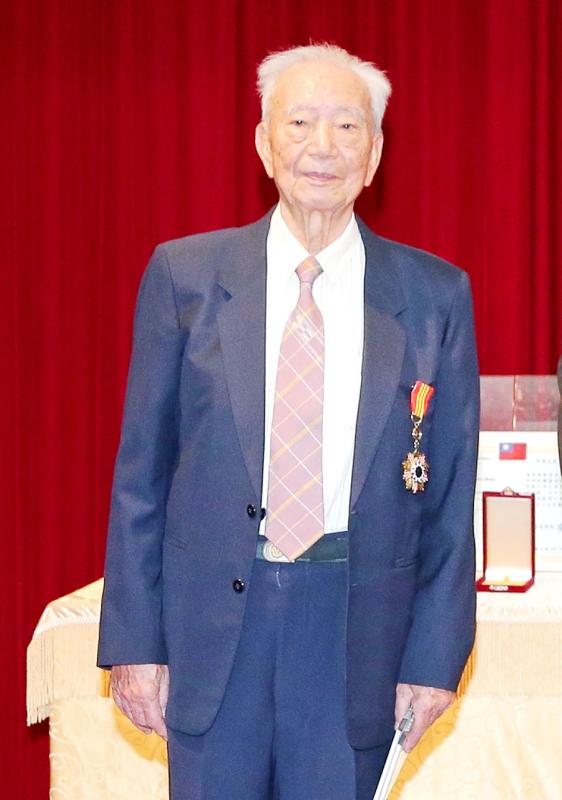Lien Jih-ching (連日清), an entomologist and public health expert who helped in the effort to have the WHO in 1965 declare Taiwan to be “malaria free,” died on Wednesday.
He was 96.
Born in Taipei’s Dadaocheng (大稻埕) area, Lien’s connection with mosquito studies began at age 15 when he worked part-time at the Tropical Medicine Research Institute at what was at the time Taihoku Imperial University, now National Taiwan University.

Photo courtesy of the Ministry of Foreign Affairs
Lien worked for Omori Nanzaburo, a Japanese entomologist, helping him to develop prevention strategies and treatments for dengue fever.
During a dengue fever outbreak in Taiwan in 1942, an estimated 5 million out of Taiwan’s population of 8 million at the time caught the disease, Lien among them.
He later said that the experience had inspired him to become an expert in mosquitoes and other insects.
Lien led a team that researched malaria prevention strategies to eradicate the disease in Taiwan.
After the WHO declaration, Lien turned his focus to dengue fever and continued to study mosquitoes, the primary vector of both diseases.
Lien is credited with the first documentation of 1 percent of all mosquito species in the world.
Tsai Kun-hsien (蔡坤憲), a professor at the National Taiwan University’s College of Public Health who worked with Lien on several overseas medical entomology missions, yesterday said that Lien never shied from his work even after contracting scrub typhus.
Even in his 80s, Lien led missions to Sao Tome and Principe, which was a diplomatic ally of Taiwan at the time, to help eradicate malaria there and train local public health personnel.
Council of Agriculture Minister Chen Chi-chung (陳吉仲) yesterday expressed his condolences to Lien’s family.
Chen lauded Lien’s contributions to entomology, public health and medicine.
The council would ask President Tsai Ing-wen (蔡英文) to present an order of praise and commendation to honor Lien’s contribution to Taiwan and the world, Chen said.

The Ministry of Economic Affairs has fined Taobao NT$1.2 million (US$36,912) for advertisements that exceed its approved business scope, requiring the Chinese e-commerce platform to make corrections in the first half of this year or its license may be revoked. Lawmakers have called for stricter enforcement of Chinese e-commerce platforms and measures to prevent China from laundering its goods through Taiwan in response to US President Donald Trump’s heavy tariffs on China. The Legislative Yuan’s Finance Committee met today to discuss policies to prevent China from dumping goods in Taiwan, inviting government agencies to report. Democratic Progressive Party Legislator Kuo Kuo-wen (郭國文) said

The Ministry of Economic Affairs has fined Taobao NT$1.2 million (US$36,900) for advertisements that exceeded its approved business scope and ordered the Chinese e-commerce platform to make corrections in the first half of this year or its license would be revoked. Lawmakers have called for stricter supervision of Chinese e-commerce platforms and more stringent measures to prevent China from laundering its goods through Taiwan as US President Donald Trump’s administration cracks down on origin laundering. The legislature’s Finance Committee yesterday met to discuss policies to prevent China from dumping goods in Taiwan, inviting government agencies to report on the matter. Democratic Progressive Party

Taiwan and its Pacific ally Tuvalu on Tuesday signed two accords aimed at facilitating bilateral cooperation on labor affairs, according to Taiwan’s Ministry of Foreign Affairs (MOFA). The governments inked two agreements in Taipei, witnessed by Foreign Minister Lin Chia-lung (林佳龍) and visiting Deputy Tuvaluan Prime Minister Panapasi Nelesone, MOFA said in a news release. According to MOFA, the agreements will facilitate cooperation on labor issues and allow the two sides to mutually recognize seafarers’ certificates and related training. Taiwan would also continue to collaborate with Tuvalu across various fields to promote economic prosperity as well as the well-being of their

Sung Chien-liang (宋建樑), who led efforts to recall Democratic Progressive Party (DPP) Legislator Lee Kun-cheng (李坤城), was released on bail of NT$80,000 today amid outcry over his decision to wear a Nazi armband to questioning the night before. Sung arrived at the New Taipei District Prosecutors’ Office for questioning in a recall petition forgery case last night wearing a red armband bearing a swastika, carrying a copy of Adolf Hitler’s Mein Kampf and giving a Nazi salute. Sung left the building at 1:15am without the armband and covering the book with his coat. Lee said today that this is a serious